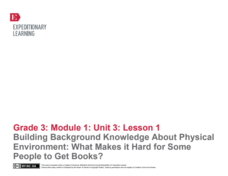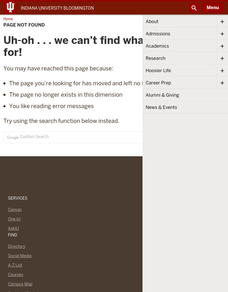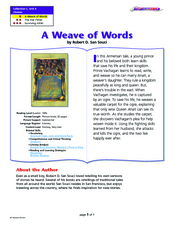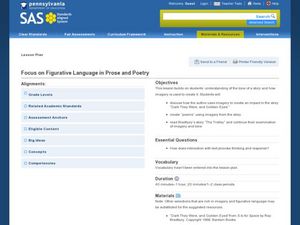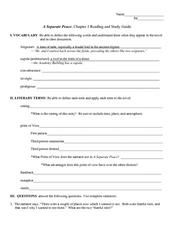Curated OER
Things Aren't Always What They Seem
Students use video and the Internet to make predictions, draw conclusions, determine conflict and point of view while reading a short story. In this short story analysis lesson, students watch a related video and complete a prediction...
National Endowment for the Humanities
Narrative Voice in Moby Dick
Call him a reliable narrator! Ishmael is the focus of a instructional activity that asks readers to analyze the complex character of Herman Melville's narrator as he is introduced in the first chapter of Moby Dick.
EngageNY
Grade 9 ELA Module 2: Unit 1, Lesson 3
Hearken! and observe how well a literary analysis unit can help ninth graders read closely and connect text structure to a central idea. Focusing on Edgar Allan Poe's "The Tell-Tale Heart," learners take notes and track the development...
Curated OER
Writing Sentences Lesson Plan
Students explore first person and third person points of view. For this perspective lesson, students identify first person and third person points of view in literature they have read. Students rewrite stories from different perspectives.
Curated OER
Prairie Poetry
Ninth graders take note of the ways in which word choice, rhythm, language and narrative voice, as well as point of view in a poem can be used to evoke a time and place. They use their insights to create a poem of their own.
Novelinks
The Devil’s Arithmetic: Concept Analysis
A helpful guide to Jane Yolen's The Devil's Arithmetic for your literature unit. Use the sections on point-of-view, dramatic irony, and background knowledge, among others, to frame your lessons in an engaging and educational way.
EngageNY
Building Background Knowledge About Physical Environment: What Makes it Hard for Some People to Get Books?
How far would your pupils go to be able to have access to books? Revisit Heather Henson and David Small's That Book Woman and challenge class members to take on the role of Cal or the Book Woman. By putting themselves in someone else's...
MENSA Education & Research Foundation
Magical Musical Tour: Using Lyrics to Teach Literary Elements
Language arts learners don't need a lecture about poetry; they listen to poetry every day on the radio! Apply skills from literary analysis to famous songs and beautiful lyrics with a instructional activity about literary devices. As...
Novelinks
The Little Prince: Concept/Vocab Analysis
Focus on the literary elements of Antoine de Saint-Exupéry's The Little Prince with a concept analysis sheet. With suggestions and explanations for many of the book's concepts, vocabulary, and other issues that may arise in instruction,...
Curated OER
Focus on Figurative Language
Using the poems "First Snow" by Ted Kooser and "Eating Alone" by Yi-Young Lee (or other suggested poems by Robert Frost or Sara Teasdale), middle schoolers search for examples of figurative language. Guide your learners by discussing...
Curated OER
Your Story, My Story
Learners write from differing points of view, and act out stories in pantomime as another student narrates.
Curated OER
A Weave of Woods
Focus on vocabulary, comprehension, and analysis while reading A Weave of Woods, a colorful picture book by Robert D. San Souci. Young learners use worksheets to preview, predict, practice paraphrasing, and make comparisons. The richly...
Curated OER
Focus On Figurative Language in Prose
Students examine the use of literary prose in the story, "Dark They Were, and Golden-Eyed." In this literary prose activity, students investigate the use of imagery, metaphor, and simile in the story. They tell how author's purpose is...
Curated OER
Focus on Figurative Language in Prose and Poetry
Young scholars place emphasis on the use of figurative language when analyzing prose and poetry. In this figurative language lesson, students explore the tone of a story and its imagery. Young scholars read and discuss how the author...
Indiana University
World Literature: "One Evening in the Rainy Season" Shi Zhecun
Did you know that modern Chinese literature “grew from the psychoanalytical theory of Sigmund Freud”? Designed for a world literature class, seniors are introduced to “One Evening in the Rainy Season,” Shi Zhecun’s stream of...
Gwinnett County Public Schools
Analysis of the Tuck Everlasting and The Birchbark House Text Exemplars
Looking to introduce some text-based questions into your ELA lessons? Practice the kinds of skills the Common Core demands with the seven text-based questions and the essay prompt provided here. Designed to be a three-day lesson, day one...
EngageNY
Gathering Evidence and Drafting a Two-Voice Poem (Chapter 13: "Los Duraznos/Peaches")
Begin class with a short comprehension quiz and review and then move into a new genre: two-voice poems. The activity provides information about this type of poetry as well as a video example made by eighth graders that you can show your...
Curated OER
Constructing Narrative from the Migrant Experience in Literature
Excerpts from John Steinbeck's The Grapes of Wrath and from John Fante's Ask the Dust, as well as a variety of primary source documents provide the background for an examination of the migrant experience from 1920-1945.
Curated OER
Discovering Language Arts-Intermediate Fiction
Explore the elements of science fiction. Students investigate the literary elements present in science fiction and write their own science fiction stories.
Curated OER
Author's Day
Have your learners choose an author to study. One resource link gives a list of approved authors. Scholars read at least three works produced by that author and produce three separate book reports as well as a two-page author report....
Curated OER
Style and Voice
Develop the writing skills of your high school class. Writers consider their personal style and voice, read selections by other authors, and then write pieces that challenge them to experiment with their own style.
Curated OER
Understanding Tiananmen Square
William Bell's Forbidden City is used as the basis of a study of China, Chinese culture and government, and especially of the events in Tiananmen Square in 1989. Class members select a topic for Internet research and then prepare a...
Curated OER
A Separate Peace: Chapter 1 Reading and Study Guide
In this reading and study guide worksheet, students define 3 vocabulary words, define 5 literary terms, and respond to 14 short answer questions pertaining to chapter 1 of John Knowles's A Separate Peace.
Curated OER
Study Guide for Saki's "The Interlopers"
For this comprehension check worksheet, students define 6 vocabulary words, define 9 literary terms, respond to 8 short answer questions, and complete a graphic organizer pertaining to "The Interlopers" by Saki in order to help them...








